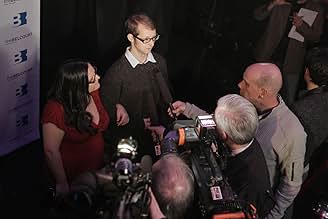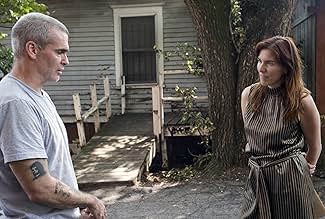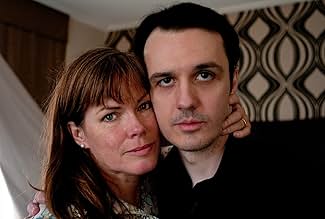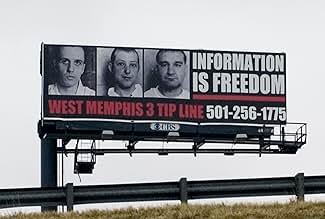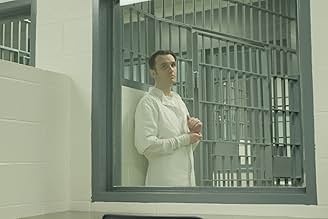An examination of a failure of justice in the case against the West Memphis Three.An examination of a failure of justice in the case against the West Memphis Three.An examination of a failure of justice in the case against the West Memphis Three.
- Nominated for 1 BAFTA Award
- 1 win & 10 nominations total
Jessie Misskelley
- Self
- (as Jessie Miskelly)
Michael Baden
- Self - Former New York City Chief Medical Examiner
- (as Dr. Michael Baden)
Jamie Clark Ballard
- Self - Neighbor of Stevie Branch
- (as Jamie Ballard)
Steve Braga
- Self - Damien Echols' Attorney
- (as Stephen Braga)
David Burnett
- Self - Trial Judge
- (as Judge David Burnett)
John Mark Byers
- Self - Christopher Byers' Father
- (as Mark Byers)
The Chicks
- Themselves
- (archive footage)
- (as Dixie Chicks)
Heather Crawford
- Self - TV News Anchor
- (archive footage)
- Director
- Writers
- All cast & crew
- Production, box office & more at IMDbPro
Featured reviews
While the story of the West Memphis Three, their awful flawed trial and subsequent efforts to obtain freedom were well covered in the "Paradise Lost" trilogy of films, this single film overview has a lot of value.
Perhaps because the case can now be looked back on in total, it feels like there is a clearer focus here than in the excellent "Paradise Lost" series. There also seems to be more of an emphasis on the emotion and humanity of all the victims – the three falsely convicted young men, but also the families that lost children.
Last, the film makes some of the awful holes in the prosecution case more simple and clear than earlier accounts, as well as putting a chilling spotlight on the possible real perpetrator, but without the theatrics that harmed 'Paradise Lost 2', which seemed guilty of what the trial did to the three boys; throw suspicion on a subject largely because he 'acted weird'.
Here the investigation into another possibility feels more dispassionate and scientific, and less manipulated, leaving one with questions rather than forcing conclusions.
The world might not have 'needed' another film on the subject, but personally, I feel the more injustice can be intelligently examined and exposed the better off we are as a society.
Perhaps because the case can now be looked back on in total, it feels like there is a clearer focus here than in the excellent "Paradise Lost" series. There also seems to be more of an emphasis on the emotion and humanity of all the victims – the three falsely convicted young men, but also the families that lost children.
Last, the film makes some of the awful holes in the prosecution case more simple and clear than earlier accounts, as well as putting a chilling spotlight on the possible real perpetrator, but without the theatrics that harmed 'Paradise Lost 2', which seemed guilty of what the trial did to the three boys; throw suspicion on a subject largely because he 'acted weird'.
Here the investigation into another possibility feels more dispassionate and scientific, and less manipulated, leaving one with questions rather than forcing conclusions.
The world might not have 'needed' another film on the subject, but personally, I feel the more injustice can be intelligently examined and exposed the better off we are as a society.
Martin Luther King said, "The arc of history is long but it bends toward justice." Justice has been a long-time coming for Damien Echols, Jason Baldwin and Jessie Misskelley, three marginalized teenagers wrongfully convicted of the 1993 murders of three eight-year-olds: Steven Branch, Michael Moore and Christopher Byers, found dead in a creek in West Memphis, Arkansas. The subject has been brought to the screen before in the "Paradise Lost" trilogy, yet the documentary West of Memphis, directed by Amy Berg and written by Billy McMillin, adds another dimension to our knowledge and understanding of the circumstances and the characters involved. It is a film of extraordinary power that has the ability to stir a range of emotions from frustration, anger, depression, to even joy.
After the victims were found beaten, bruised, and sexually mutilated, hysteria gripped the town and word circulated about the killings being the work of a satanic cult. Despite a lack of physical evidence, the accused teenagers were charged with three counts of capital murder and brought to trial. Damien Echols was sentenced to death, while Jason Baldwin and Jessie Misskelley both received life sentences. Jesse confessed to the crime but the audio recording of Jessie's interrogation reveals that the prosecution took advantage of the mildly retarded boy by feeding him the desired answers. Soon after the verdict was handed down much to the relief of the bereaved parents and frightened residents, critics of the case began to point to serious discrepancies in the evidence.
It was also found out later that many of the visible physical injuries were caused after the children's death by turtles living in the swamp. The subsequent media attention led to a twenty-year campaign to free the inmates who become known as the Memphis 3. West of Memphis includes archival footage of the trial and press reports, a police investigation video, and contemporary interviews with victim's families, supporters of the convicted men including their attorneys, and celebrities such as Johnnie Depp, Eddie Vedder, and filmmakers Peter Jackson and Fran Walsh. If not for the courage and, of course, the financial support of those who fought a long battle to overturn the convictions, Damian might have been executed years ago.
Of the three convicted men, much of the film's focus is on Damian, a self-educated and highly articulate young man, describing his correspondence and subsequent marriage to New York Landscape Architect Lorri Davis. Despite the community protest and continued investigation of the case that unearthed new evidence, particularly DNA evidence, it became increasingly apparent that the justice system in Arkansas would rather perpetuate a lie than admit serious mistakes and become vulnerable to a series of damage suits. Even though he is presented with overwhelming evidence for a new trial, the original judge, David Burnett (now a state senator) refused to reconsider the case.
As a result of the continued pressure by those working for the boys' release, another suspect emerges who has never been investigated before and was the last person seen with the murdered boys. The thrust of this new lead propels West of Memphis toward a dramatic and surprising conclusion. Although some of the tactics of the investigation are open to question, such as filming a young girl's session with a psychiatrist and recording a private telephone conversation, West of Memphis is a riveting experience that suggests incidents of injustice and abuse of power such as this may be more common than we think.
After the victims were found beaten, bruised, and sexually mutilated, hysteria gripped the town and word circulated about the killings being the work of a satanic cult. Despite a lack of physical evidence, the accused teenagers were charged with three counts of capital murder and brought to trial. Damien Echols was sentenced to death, while Jason Baldwin and Jessie Misskelley both received life sentences. Jesse confessed to the crime but the audio recording of Jessie's interrogation reveals that the prosecution took advantage of the mildly retarded boy by feeding him the desired answers. Soon after the verdict was handed down much to the relief of the bereaved parents and frightened residents, critics of the case began to point to serious discrepancies in the evidence.
It was also found out later that many of the visible physical injuries were caused after the children's death by turtles living in the swamp. The subsequent media attention led to a twenty-year campaign to free the inmates who become known as the Memphis 3. West of Memphis includes archival footage of the trial and press reports, a police investigation video, and contemporary interviews with victim's families, supporters of the convicted men including their attorneys, and celebrities such as Johnnie Depp, Eddie Vedder, and filmmakers Peter Jackson and Fran Walsh. If not for the courage and, of course, the financial support of those who fought a long battle to overturn the convictions, Damian might have been executed years ago.
Of the three convicted men, much of the film's focus is on Damian, a self-educated and highly articulate young man, describing his correspondence and subsequent marriage to New York Landscape Architect Lorri Davis. Despite the community protest and continued investigation of the case that unearthed new evidence, particularly DNA evidence, it became increasingly apparent that the justice system in Arkansas would rather perpetuate a lie than admit serious mistakes and become vulnerable to a series of damage suits. Even though he is presented with overwhelming evidence for a new trial, the original judge, David Burnett (now a state senator) refused to reconsider the case.
As a result of the continued pressure by those working for the boys' release, another suspect emerges who has never been investigated before and was the last person seen with the murdered boys. The thrust of this new lead propels West of Memphis toward a dramatic and surprising conclusion. Although some of the tactics of the investigation are open to question, such as filming a young girl's session with a psychiatrist and recording a private telephone conversation, West of Memphis is a riveting experience that suggests incidents of injustice and abuse of power such as this may be more common than we think.
'WEST OF MEMPHIS': Four and a Half Stars (Out of Five) A documentary film on the West Memphis Three case, in which three teenage outcasts (Damien Echols, Jason Baldwin and Jessie Misskelley) were arrested and charged with the murder of three 8-year old boys (Steven Branch, Christopher Byers and Michael Moore), despite the lack of any conclusive evidence and apparent police and prosecutor misconduct. The boys spent eighteen years in prison and were released in August of 2011 as part of a deal reached with prosecutors due to new evidence. The film was directed and co-written (along with Billy McMillin) by Amy Berg (who also directed the 2006 documentary 'DELIVER US FROM EVIL', about the Catholic Church's cover up of a priest's sexual abuse, towards dozens of young boys, in the 70s). It was produced by Berg, Echols and Lori Davis as well as filmmakers Peter Jackson and his wife Fran Walsh. The movie is heartbreaking, frustrating and very disturbing but it's also inspiring in the way it shows how many people came forward to support justice and the freeing of these (presumably) wrongfully convicted men. The film tells the story of Damien Echols, Jason Baldwin and Jessie Misskelley (known as 'The West Memphis Three'), who were tried and convicted of the 1993 murders of three 8-year old boys in West Memphis, Arkansas in 1994. Echols was sentenced to death and the other two were sentenced to life imprisonment. The prosecution claimed that the three misfits killed the young boys as part of a satanic ritual but had no physical evidence to backup their claim. They were convicted on a theory, a forced confession of a mentally handicap teen (Misskelley) and the testimony of some shady witnesses (who later retracted their statements and admitted they were lying). Multiple HBO documentaries have been made on the subject which have motivated many to come forward in defense of the accused, including several celebrities (like Jackson, Walsh, Eddie Vedder, Henry Rollins and Johnny Depp to name a few). New forensic evidence allowed a deal to be reached with prosecutors where 'The Memphis Three' were released from prison under time served (18 years) due to Alford pleas (which allowed the three to maintain their innocence while admitting that the prosecution had enough evidence to convict them (a disgraceful way for the prosecution to avoid the embarrassment of a retrial and admitting they were wrong). The events of the entire ordeal are explained in detail through interviews with several of those involved. There's also a lot of evidence provided pointing to the most likely killer of the three young boys (Steven Branch's stepfather Terry Hobbs). The film is the classic tale of people in power taking advantage of the weak that can't defend themselves (three misfit teens in this case) and society exploiting someone for looking different and acting 'weird' (therefore he's 'creepy' and there must be something wrong with him). This sort of thing happens all the time, this is just one of those times it's been brought to the public's attention. Which is a good enough reason, on it's own, why no one (with any morals of any kind) should support the death penalty. The movie is infuriating, depressing and horrifying but it's also ultimately inspiring. It's also very relatable, to some, and shows how people that are different are often used and abused by society. That's why so many musicians and other celebrities felt for these young men and got involved in trying to help them. It's a movie that we can all learn a lot from. It still leaves a lot of questions and doesn't reach a completely satisfying conclusion (because one wasn't reached in real life) but the filmmakers did about as good a job bringing this story to light (in more detail, to the masses) as they possibly could. A must see!
West of Memphis (2012)
**** (out of 4)
This here is basically the fourth documentary to take a look at the West Memphis Three case, which gained worldwide attention after the PARADISE LOST trilogy. Countless celebrities including Johnny Depp, Eddie Vedder, Henry Rollins and Peter Jackson came to the three men's cause and they are also featured here.
So what this fourth film basically does is give you an overview of the case as well as new bits of information regarding who the killer might be. Let me start off by saying that this is a wonderfully entertaining film even though it is hard to watch at times since crime photos are shown in great detail. In fact, I will say that all four films on the subject were wonderful and certainly highly entertaining.
With that said, as they bring up in this movie, the case will always be controversial with some believing the three men are guilty and others believing that they were set up by some crooked cops. Some believe that the media attention got three killers off with murder while others believe that the media forced the state of Arkansas to set the guys free. Even at the end, the controversy continues as the three men admit to be guilty but take a loophole law to say they're also innocent.
I must admit that the PARADISE LOST series tried to place blame on one of the stepfather's but that person is shown as a great guy here. A new suspect is brought into play with evidence linking him to the crime but due to this loophole he will never be brought to trial. All four movies have demanded that the three men be released from prison and they have been. My question is now: what about the person who committed the crimes? What about the parents to the three murdered children? Is anything being done for them?
**** (out of 4)
This here is basically the fourth documentary to take a look at the West Memphis Three case, which gained worldwide attention after the PARADISE LOST trilogy. Countless celebrities including Johnny Depp, Eddie Vedder, Henry Rollins and Peter Jackson came to the three men's cause and they are also featured here.
So what this fourth film basically does is give you an overview of the case as well as new bits of information regarding who the killer might be. Let me start off by saying that this is a wonderfully entertaining film even though it is hard to watch at times since crime photos are shown in great detail. In fact, I will say that all four films on the subject were wonderful and certainly highly entertaining.
With that said, as they bring up in this movie, the case will always be controversial with some believing the three men are guilty and others believing that they were set up by some crooked cops. Some believe that the media attention got three killers off with murder while others believe that the media forced the state of Arkansas to set the guys free. Even at the end, the controversy continues as the three men admit to be guilty but take a loophole law to say they're also innocent.
I must admit that the PARADISE LOST series tried to place blame on one of the stepfather's but that person is shown as a great guy here. A new suspect is brought into play with evidence linking him to the crime but due to this loophole he will never be brought to trial. All four movies have demanded that the three men be released from prison and they have been. My question is now: what about the person who committed the crimes? What about the parents to the three murdered children? Is anything being done for them?
The 'West Memphis 3' were first brought to my attention back in 2007/2008 when I viewed the astonishingly eye-opening documentary Paradise Lost: The Child Murders at Robin Hood Hills (1996), which I watched back-to-back with its sequel Revelations: Paradise Lost 2 (2000). The case was so fascinating due to its unbelievable revelations of the flaws in the American justice system that I was more than happy to spend over 5 enthralling hours of my night watching it unravel. Those films brought mass attention to the case, due to the fact that the three accused - Damien Wayne Echols, Jason Baldwin and Jessie Misskelley - were so blatantly innocent of this terrible crime. I assumed justice would prevail, and it soon left my mind. So it was shocking to learn upon the release of the third instalment of the trilogy, Paradise Lost 3: Purgatory (2011), and this, West of Memphis, that these three were still in prison, 19 years after the murders, with everything from mere bureaucracy and political motivations standing in their, and thousands of others, way.
For those unacquainted with the case, back in 1993, the mutilated bodies of three young boys - Christopher Byers, Steven Branch and Michael Moore - were found in a stream in the Robin Hood Hills, West Memphis. With no evidence, prosecutors quickly deemed the murders a result of Satanic ritual, due to (apparently) sexual mutiliation, and sought out any locals known to practise such an art. They were given the names of three youngsters, Echols, Baldwin and Miskelley, who were known to listen to heavy metal music and act much like your typical isolated, 'gothic' teenagers. Through manipulation of the jury, and a trial by media, the three were quickly convicted (again, with no evidence against them, apart from a heavily dubious 'confession' by the borderline mentally retarded Misskelley). They were given life, with Echols possibly facing the death sentence. Interest in the case quickly gathered, due to many aspects not making any sense, and gathered support of musicians such as Metallica, Henry Rollins, Patti Smith, and Eddie Vedder of Pearl Jam. West of Memphis focuses on the fight to free the West Memphis 3, with new evidence gathered and possibly a revelation as to who the killer may actually be.
West of Memphis doesn't spend much time treading the same ground as the Paradise Lost trilogy, and quickly covers the original trial. It consists mainly of original footage, such as the lawyers and investigators funded by supporters of the West Memphis 3 and various celebrities such as the film's producers Peter Jackson and Fran Walsh trying to find fresh evidence in favour of the 3, and footage of the various concerts designed to raise awareness and make money. But where West of Memphis truly invigorates is the alarming case built against Terry Hobbs, stepfather of Steven Branch, who was all but ignored by police in the original investigation. Paradise Lost 2 brought up the possibility of another stepfather, John Mark Byers, being the culprit, but often felt like he was a suspect due to him simply being quite strange, which seems hypocritical considering the West Memphis 3 were convicted for the same reason. But there is strong evidence against Hobbs, such as a violent past, the lack of an alibi during the time of the deaths, and his hair being found within the knot of the shoelaces to which the three boys were hog-tied with.
Above all, West of Memphis is a staunch reminder of the darkness of this case. This was a horrific crime, almost beyond belief (and the sights of the three corpses really hammers this home), and an equally disturbing path of 'justice' that followed. This is a deep, dark stain on the American justice system, where political aspirations, ignorance and outright lying stand in the way of true justice. They do walk free in the end, but not without leaving a bitter taste in the mouth. They had 19 years of their life stolen from them, yet to be free they must plead guilty to a crime everyone knows they did commit. In the eyes of the law, the West Memphis 3 are child murderers, while the real murderer walks free with a clean name. The Paradise Lost films and West of Memphis, if anything, are a testament to the power of film, along with Errol Morris' The Thin Blue Line (1988), which exposed police ineptitude and helped set an innocent man free, but above all else, they are a terrifying and utterly depressing indictment of a country that needs to take a good look at itself.
www.the-wrath-of-blog.blogspot.com
For those unacquainted with the case, back in 1993, the mutilated bodies of three young boys - Christopher Byers, Steven Branch and Michael Moore - were found in a stream in the Robin Hood Hills, West Memphis. With no evidence, prosecutors quickly deemed the murders a result of Satanic ritual, due to (apparently) sexual mutiliation, and sought out any locals known to practise such an art. They were given the names of three youngsters, Echols, Baldwin and Miskelley, who were known to listen to heavy metal music and act much like your typical isolated, 'gothic' teenagers. Through manipulation of the jury, and a trial by media, the three were quickly convicted (again, with no evidence against them, apart from a heavily dubious 'confession' by the borderline mentally retarded Misskelley). They were given life, with Echols possibly facing the death sentence. Interest in the case quickly gathered, due to many aspects not making any sense, and gathered support of musicians such as Metallica, Henry Rollins, Patti Smith, and Eddie Vedder of Pearl Jam. West of Memphis focuses on the fight to free the West Memphis 3, with new evidence gathered and possibly a revelation as to who the killer may actually be.
West of Memphis doesn't spend much time treading the same ground as the Paradise Lost trilogy, and quickly covers the original trial. It consists mainly of original footage, such as the lawyers and investigators funded by supporters of the West Memphis 3 and various celebrities such as the film's producers Peter Jackson and Fran Walsh trying to find fresh evidence in favour of the 3, and footage of the various concerts designed to raise awareness and make money. But where West of Memphis truly invigorates is the alarming case built against Terry Hobbs, stepfather of Steven Branch, who was all but ignored by police in the original investigation. Paradise Lost 2 brought up the possibility of another stepfather, John Mark Byers, being the culprit, but often felt like he was a suspect due to him simply being quite strange, which seems hypocritical considering the West Memphis 3 were convicted for the same reason. But there is strong evidence against Hobbs, such as a violent past, the lack of an alibi during the time of the deaths, and his hair being found within the knot of the shoelaces to which the three boys were hog-tied with.
Above all, West of Memphis is a staunch reminder of the darkness of this case. This was a horrific crime, almost beyond belief (and the sights of the three corpses really hammers this home), and an equally disturbing path of 'justice' that followed. This is a deep, dark stain on the American justice system, where political aspirations, ignorance and outright lying stand in the way of true justice. They do walk free in the end, but not without leaving a bitter taste in the mouth. They had 19 years of their life stolen from them, yet to be free they must plead guilty to a crime everyone knows they did commit. In the eyes of the law, the West Memphis 3 are child murderers, while the real murderer walks free with a clean name. The Paradise Lost films and West of Memphis, if anything, are a testament to the power of film, along with Errol Morris' The Thin Blue Line (1988), which exposed police ineptitude and helped set an innocent man free, but above all else, they are a terrifying and utterly depressing indictment of a country that needs to take a good look at itself.
www.the-wrath-of-blog.blogspot.com
Did you know
- TriviaAll entries contain spoilers
- Quotes
Damien Wayne Echols: The thing I like most about time is that it's not real. It's all in the head. Sure, it's a useful trick if you wanna meet someone at a specific place in the universe to have tea or coffee. But that's all it is, a trick. There's no such thing as the past, it exists only in the memory. There's no such thing as the future, it exists only in our imagination. If our watches were truly accurate the only thing they would ever say is now.
- ConnectionsFeatured in At the Movies: Episode #10.1 (2013)
- SoundtracksThe Times They Are a-Changin'
Written by Bob Dylan
Performed by Eddie Vedder
Published by Special Rider Music (SESAC)
Courtesy of Fearless Films
- How long is West of Memphis?Powered by Alexa
Details
Box office
- Gross US & Canada
- $310,154
- Opening weekend US & Canada
- $13,360
- Dec 30, 2012
- Gross worldwide
- $318,317
- Runtime2 hours 27 minutes
- Color
- Sound mix
- Aspect ratio
- 1.85 : 1
Contribute to this page
Suggest an edit or add missing content









